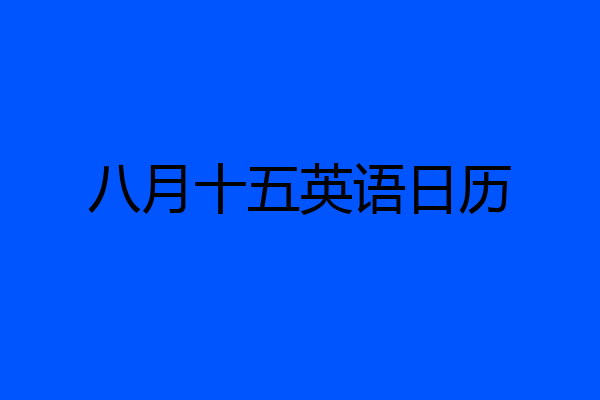
洛林小叮当
农历八月十五日是中国的传统节日——中秋节。在这天,每个家庭都团聚在一起,一家人共同观赏象征丰裕、和谐和幸运的圆月。此时,大人们吃着美味的月饼,品着热腾腾的香茗,而孩子们则在一旁拉着兔子灯尽情玩耍。
"Zhong Qiu Jie", which is also known as the Mid-Autumn Festival, is celebrated on the 15th day of the 8th month of the lunar calendar. It is a time for family members and loved ones to congregate and enjoy the full moon - an auspicious symbol of abundance, harmony and luck. Adults will usually indulge in fragrant mooncakes of many varieties with a good cup of piping hot Chinese tea, while the little ones run around with their brightly-lit lanterns.
中秋节
中秋节,又称月夕、秋节、仲秋节、八月节、八月会、追月节、玩月节、拜月节、女儿节或团圆节,是流行于中国众多民族与汉字文化圈诸国的传统文化节日,时在农历八月十五;因其恰值三秋之半,故名,也有些地方将中秋节定在八月十六。 中秋节始于唐朝初年,盛行于宋朝,至明清时,已成为与春节齐名的中国主要节日之一。受中华文化的影响,中秋节也是东亚和东南亚一些国家尤其是当地的华人华侨的传统节日。自2008年起中秋节被列为国家法定节假日。


红枫叶马大姐
The Chinese lunar calendar in August 15,is the Mid-Autumn festival. 手机提问的朋友在客户端右上角评价点【满意】即可. 互相帮助,祝共同进步!

我的小满
Mid-Autumn Festival in Lunar August 15.
The Mid-Autumn is a very important Chinese festival. It falls on the 15th day of August. A few days before the festival, everyone in the family will help to make the house clean and beautiful. Lanterns will be hung in front of the house.

阿迪思念
The Mid-Autumn Festival which is Chinese traditional festival falls on the fifteenth day of the eighth lunar month every year.
中秋节在英语是 Mid-Autumn Festival,
农历在英语是用lunar month ;
which后面接的是定语从句,前面的The Mid-Autumn Festival 是后面句子的主语。

一剪寒梅love
Mooncakes are to Mid-Autumn Festival what mince pies are to Christmas. The seasonal round cakes traditionally have a sweet filling of lotus seed paste or red bean paste and often have one or more salted duck eggs in the center to represent the moon. And the moon is what this celebration is all about. Mid-Autumn Festival falls on the 15th day of the 8th month, it is the time when the moon is said to be at its brightest and fullest. This year the festival falls on October 1. There are two legends which claim to explain the tradition of eating mooncakes. One Tang Dynasty myth holds that the Earth once had 10 suns circling it. One day all 10 suns appeared at once, scorching the planet with their heat. It was thanks to a skillful archer named Hou Yi that the Earth was saved. He shot down all but one of the suns. As his reward, the Heavenly Queen Mother gave Hou Yi the Elixir of Immortality, but she warned him that he must use it wisely. Hou Yi ignored her advice and, corrupted by fame and fortune, became a tyrannical leader. Chang-Er, his beautiful wife, could no longer stand by and watch him abuse his power so she stole his Elixir and fled to the moon to escape his angry wrath. And thus began the legend of the beautiful woman in the moon, the Moon Fairy. The second legend has it that during the Yuan Dynasty, an underground group led by Zhu Yuan Zang was determined to rid the country of Mongolian dominance. The moon cake was created to carry a secret message. When the cake was opened and the message read, an uprising was unleashed which successfully routed the Mongolians. It happened at the time of the full moon, which, some say, explains why mooncakes are eaten at this time. Mooncakes are usually stamped with Chinese characters indicating the name of the bakery and the type of filling used. Some bakeries will even stamp them with your family name so that you can give personalised ones to friends and family. They are usually presented in boxes of four which indicate the four phases of the moon. Traditional mooncakes are made with melted lard, but today vegetable oil is more often used in the interests of health. Mooncakes are not for the diet-conscious as they are loaded with calories. The best way to wash down one of these sticky cakes is with a cup of Chinese tea, especially Jasmine or Chrysanthemum tea, which aids the digestion. 中秋节吃月饼就像西方人圣诞节吃百果馅饼一样,是必不可少的。圆圆的月饼中通常包有香甜的莲子馅或是红豆馅,馅的中央还会加上一个金黄的咸鸭蛋黄来代表月亮。而月亮正是中秋节庆祝的主题。每年农历8月15日人们一起庆祝中秋,据说这一天的月亮是一年中最亮最圆的。今年的中秋节恰好是阳历的10月1日(中国的国庆日)。 关于吃月饼这个传统的来历有两个传说。一个是唐朝的神话故事,说的是当时地球被10个太阳包围着。有一天10个太阳同时出现在天空中,巨大的热量几乎把地球烤焦了。多亏一位名叫后羿的神箭手射下了9个太阳,地球才被保住。为了奖励后羿,王母娘娘赐给后羿一种长生不老药,但是王母警告他必须正当使用。然而后羿没有理会王母娘娘的警告,他被名利冲昏了头脑,变成了一个暴君。后羿美丽的妻子嫦娥对他的暴行再也不能袖手旁观,于是她偷走了后羿的长生不老药,飞到月亮上逃避后羿的狂怒。从此就有了关于月宫仙子嫦娥,这个月亮上的美丽女人的传说。 第二个传说讲的是在元朝,朱元璋领导的起义军计划起义来摆脱蒙古族的统治。他们用月饼来传递密信。掰开月饼就可以找到里面的密信,起义军通过这种方式成功的发动了起义,赶走了元朝的统治者。这场起义发生在八月十五之时,于是中秋节吃月饼的习俗便在民间传开来。

九尾天使
The Mid Autumn Festival falls is on August 15 of the lunar calendar.
Festival
英 ['festɪvl] 美 ['festɪvl]
adj. 节日的;喜庆的;n. 节日;欢宴;庆祝及祭祀。
The carnival was immersed in a festival atmosphere.
嘉年华沉浸在节日的气氛中。
词语用法
1、festival的意思是“节日”,多指民俗或宗教节日,用作专有名词时,其前须加定冠词; 有时还可指音乐、戏剧、电影等会演性的节日。
2、一般来说,由定语加名词festival组成的节日,在表示的时候都需加冠定词,如the Spring Festival(春节)。

秋末夏初
The Mid Autumn Festival is on August 15 of the lunar calendar。(中秋节在农历8月15)
中秋节起源于上古时代,普及于汉代,定型于唐朝初年,盛行于宋朝以后。中秋节是秋季时令习俗的综合,其所包含的节俗因素,大都有古老的渊源。中秋节以月之圆兆人之团圆,为寄托思念故乡,思念亲人之情,祈盼丰收、幸福,成为丰富多彩、弥足珍贵的文化遗产。
中秋节与春节、清明节、端午节并称为中国四大传统节日。受中华文化的影响,中秋节也是东亚和东南亚一些国家尤其是当地的华人华侨的传统节日。2006年5月20日,国务院将其列入首批国家级非物质文化遗产名录。自2008年起中秋节被列为国家法定节假日。
扩展资料
中秋节是上古天象崇拜——敬月习俗的遗痕。在二十四节气“秋分”时节,是古老的“祭月节”,中秋节则是由传统的“祭月”而来。在传统文化中,月亮和太阳一样,这两个交替出现的天体成了先民崇拜的对象。
中秋节庆源自古人对月亮的祭祀,是中华民族祭月习俗的遗存和衍生。祭月,在我国是一种十分古老的习俗,实际上是古时代我国一些地方古人对“月神”的一种崇拜活动。
据考证,最初“祭月节”是定在干支历二十四节气“秋分”这天,不过由于历史发展,后来历法融合,使用阴历(夏历),所以将“祭月节”由干支历二十四节气“秋分”调至夏历(农历)八月十五。中秋节是秋季时令习俗的综合,其所包含的节俗因素,大都有古老的渊源